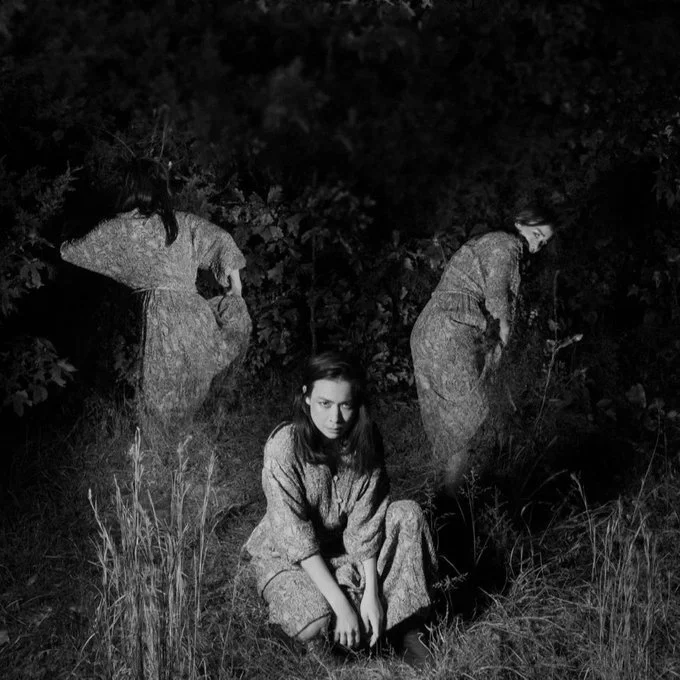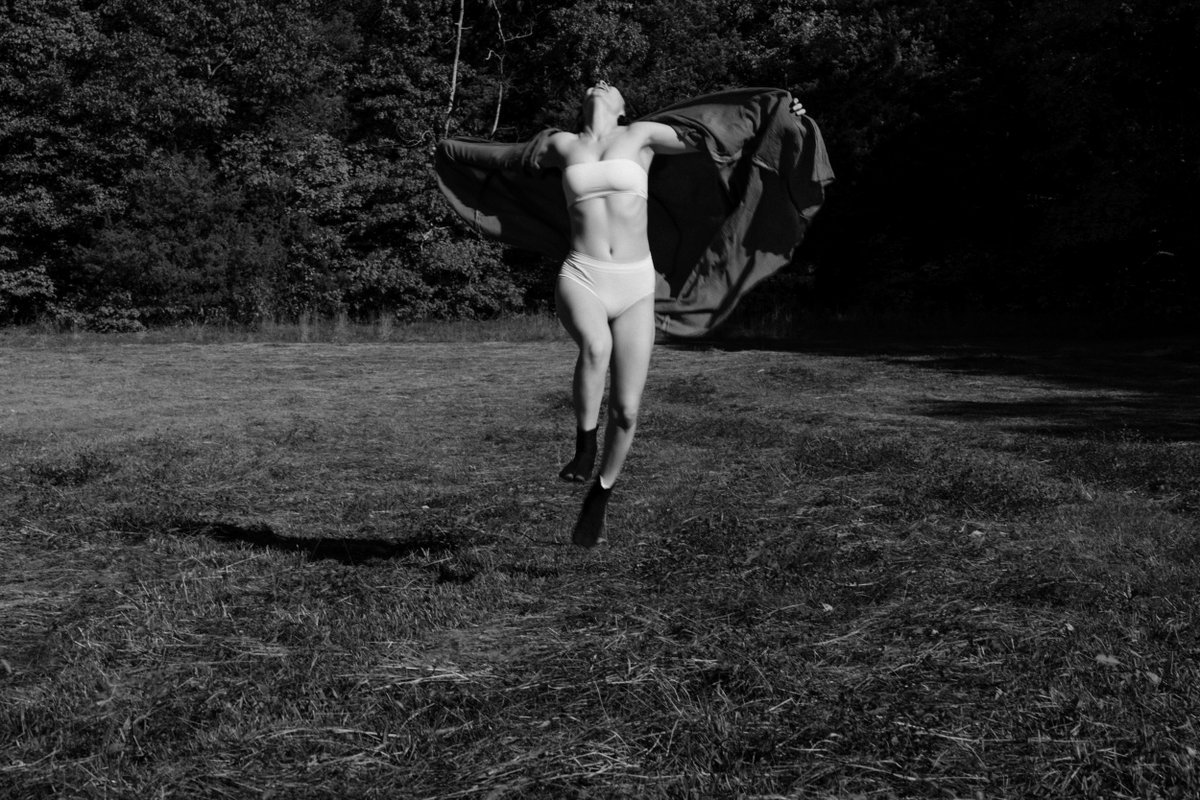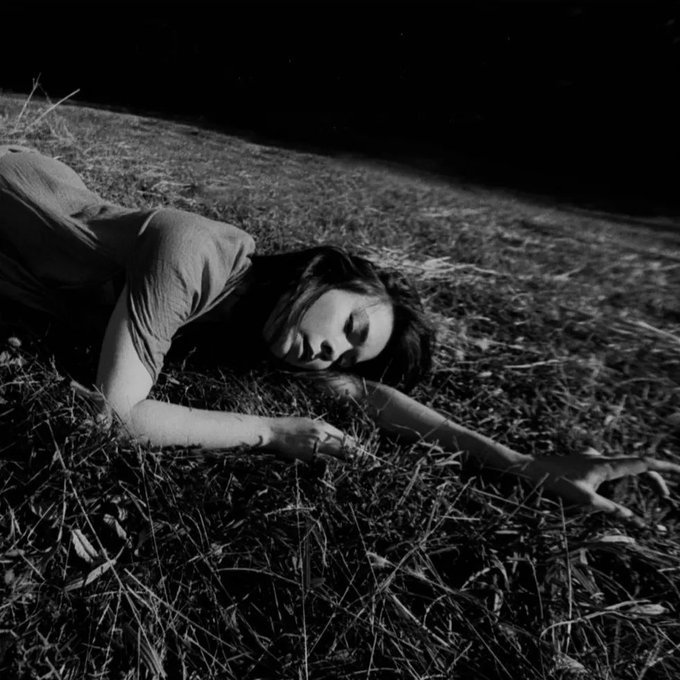Mitski’s American Epic: A Review of The Land Is Inhospitable and So Are We
Mixed Asian Media - September 26, 2023
Jalen Jones and Bri Ng Schwartz
Photos by: Ebru Yıldız
“I hate when people watch me listen to music,” Mitski announces. She is not physically with her fans in the Village East by Angelika, but her presence is felt from afar. In the dark movie theater, a voice from the speakers quells the anticipation. She tells us we’re about to hear her new album, in complete darkness, so that it can be the center of our experience.
Mitski’s dedication to her career puts her in a precarious position. The appreciation and respect she has for her career is evident, but fitting such love into the dehumanizing jaws of capitalism comes with a cost. With more than a decade in the business, she’s been thrown into the ringer, and churned out void and disaffected. “I put my most intimate feelings in a song and sold it,” she told Vulture, before releasing the contractually obligated Laurel Hell and spelling an end to her once-indefinite hiatus announced two years prior.
Mitski’s career has long been punctuated with rumors of her one day saving herself and departing from the music industry. When she released Laurel Hell, fans wondered if that would be the last we’d hear from her. In an email coinciding with the release of her lead single “Bug Like an Angel,” Mitski addressed these rumors, seemingly putting them to rest for the final time. “Ultimately, I recognized that I really want to keep making music, and I’m willing to take the difficult stuff with the wonderful stuff - like any job, or relationship, or worthwhile thing in life.”
Confronting the difficult “stuff” as Mitski calls it, has brought her to her seventh record, The Land Is Inhospitable and So Are We. The album plays out as an American epic, confronting our land’s innermost bruises and icing them back to health. “This is my most American album,” Mitski says in the press release. And she’s right: The Land bounds between gaping valleys of hope and despair, yet never quite gives us any simple answers to leave with. In true Nashville fashion, this album is made up of honky tonk hits with a somber Mitski twist.
Arriving quickly off the heels of her last album, Mitski took the soft and sloping reverb, her trademark brutal honesty, and flipped everything else on its head. Laurel Hell was a disco-inspired minefield of synthesizers and drum machines that danced with lyrical minimalism. The Land, on the other hand, is a country-rock feat that tests Mitski’s ability to wander until she’s painted the entire portrait, pressing up against the limits of negative capability. Rather than dance away from the numbness, this record swings deeper into its wake.
“Bug Like an Angel” opens the album to a fragile character struggling with, and finding comfort in, her addiction. Echoing the short fiction tendencies of Be The Cowboy, Mitski’s songs on this record build stories around various characters going through their individual struggles, failures, and healings. Yet at the same time, these could all be interpreted as versions of Mitski herself. “I have a million selves, and they’re all me,” Mitski says in the press release, “and I inhabit them, and they all live inside me.”
Though Mitski is the only one here, the imagery evoked in The Land grows slightly crowded. This record witnesses Mitski accomplish her most vast and crystal-clear worldbuilding. Listeners replace buffalo with the threatening rumble of trains in “Buffalo Replaced,” shovel memories of snow out the driveway in “When Memories Snow,” and witness dust settle in a postapocalyptic attic in “The Frost.” The precision of Mitski’s lyricism contrasts with the reaching sounds of the pedal steel and acoustic guitars that ring through these tracks. This is amplified further by her singing, which undergoes a heavy use of reverb that brings her voice to a cool tone that soothes from a far-off canyon. No longer can we hear the jagged edges characteristic of her early grunge, indie-rock classics like “Townie” or “Francis Forever.” This Mitski sings for posterity.
The Land takes its time, only gaining a sense of urgency four tracks in with “I Don’t Like My Mind.” The narrator of this aching track begs for solace from herself, wishing for an escape from both mental and financial instability as steel guitars lull her into submission. In the next track, the vaguely spaghetti western “The Deal,” our narrator has had enough — she’s ready to move on from herself. Mitski’s storytelling is at its strongest here, and we watch as the character sells her soul, to no real benefit of her own. “Your pain is eased,” a bird taunts her in the track, “but you’ll never be free.” Upon realizing her fate, our character drowns in the raging gallop of a drum set, engulfing us in a Fiona Apple-esque calamity of sound — the modern musician’s signal of all-consuming nihilism.
This record is Mitski’s first to incorporate a band recording live together in the studio. This is clearest in the album’s most maximalist track, “When Memories Snow.” A 17-person choir evokes the howls of a snowstorm before a full orchestra erupts into rising arpeggios that send us further into what Mitski ominously refers to as “the dark.”
In said darkness, however, lies the heart of The Land. A clear standout of the record, “My Love Mine All Mine” glows like an intimate, love-drunk slow dance. Mitski shines over a relaxed jazz beat, singing of the comforts of love while yearning for hers to outlast her mortal life. The fragile, mesmerizing song could read as a soothing last will and testament. Perhaps it's also Mitski’s final exasperated punch at the capitalist machine. “Nothing in the world is mine for free / But my love, mine all mine all mine,” she coos down to us from above. We’re better off receiving it for as long as it lasts us. Here lies the only simple answer of the record: Maybe love is all we’ve got in this inhospitable life.
Uncharacteristically for a Mitski album, The Land concludes with little emotional release. The apparent final showdown, “I’m Your Man,” feels lost in its lyricism as it calls back to the ruthless, apathetic God introduced in the premiere single, circling around the revelation that He was Mitski all along. The slow-rock closer, “I Love Me After You,” is best described as restrained, yet harrowing. The narrator sings of a grim freedom, now that the land is uninhabited and they’re finally, perfectly alone. But in the final seconds, the droning guitars are prematurely pinned. You hear something fall over and are left feeling empty when you notice the sound of a tightening rope.
For The Land, Mitski paints a portrait of how love sustains us and reveals what happens to a land and its people when we find ourselves without it. So how has she decided to keep that love alive? By turning it into an album, and hosting events for her fans to experience it together.
Across the U.S., thousands gathered for advanced listening events, paired with classic films of Mitski’s choosing. During one of the New York events, she blessed her fans with a screening of the novel-turned-1985-cult-classic film Desert Hearts. The film follows Vivian Bell, a recently divorced professor who finds herself in Reno, Nevada, among the desert, southwestern nightlife, and a femme love interest by the name of Cay Rivers. Suddenly, The Land Is Inhospitable and So Are We and Desert Hearts are one. Immersed in the southwestern aesthetics of both the album and movie, we are reminded of the torrid affair we call life.
So what, according to Mitski, makes this life worth it? Does the love that remains in the rubble of an inhospitable land keep her coming back? Or is it a desire to leave something of her own behind in the rubble once she is gone? After a decade-long battle between her artistic and commodified selves, Mitski ensures us with her seventh record that her love will be haunting us for years and years to come.
Jalen Jones is a Black and Filipino writer, poet, director, and all around creative who came of age in Eagle Rock and the greater Los Angeles county. Over the years he has hosted a children's workout DVD series, directed an Emmy Award winning Public Service Announcement, and produced the NAACP Image Award nominated short film "The Power of Hope."
Passionate about portraying the real, the unpinpointable, and the almost-unsayable, Jalen has published a wide array of poetry and creative work that lands on these very discoveries. More than anything, he hopes to build a house out of words that can make anyone and everyone feel like they belong. Find him on Instagram @jalen_g_jones and online at jalen-jones.com.
Bri Ng Schwartz (she/her/hers) is an artist, educator and administrator based in Brooklyn, NY. Her current roles include Education & Community Outreach Manager at Primary Stages and Teaching Artist at Girl Be Heard. Having received a double major in Dramaturgy/Dramatic Criticism and Women's & Gender Studies from DePaul University, her early credits come from her time in Chicago, notably at Free Street Theater in various titles. Since relocating to New York, she has served in various administrative capacities for arts and cultural institutions. She has also written for publications such as HowlRound and American Theater Magazine. www.bringschwartz.com






